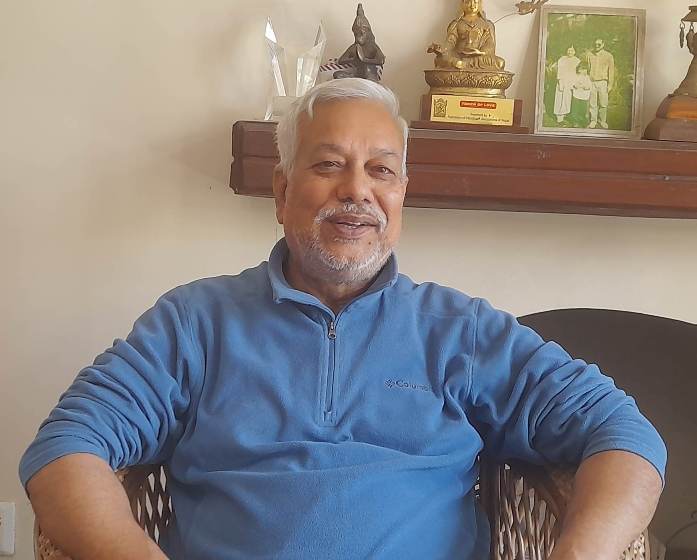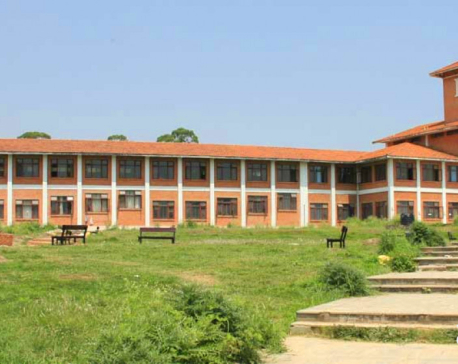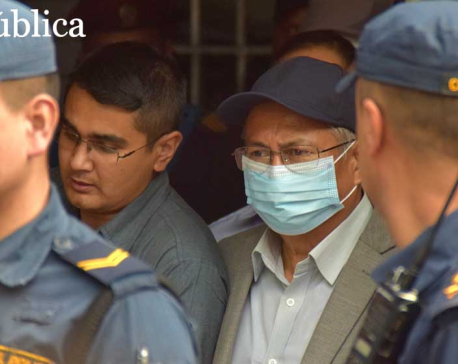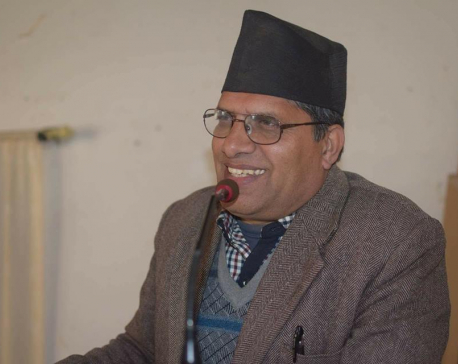
OR
#Interview
'Fake Bhutanese refugee case should not be handed over to CIAA until police conclude investigation'
Published On: May 13, 2023 10:21 PM NPT By: Republica | @RepublicaNepal

Shankar Prasad Koirala, a retired government secretary from Nepal, brings with him decades of experience from his time at the Ministry of Home Affairs. He served as the chief district officer (CDO) in various districts, including Jhapa, during the government's efforts to address the Bhutanese refugee situation through third-country resettlement programs. Secretary Koirala also dedicated a significant amount of time to the Peace and Security Division within the home ministry. This division's main responsibility is to coordinate with district administration offices nationwide and ensure collaboration with donor agencies regarding matters concerning home administration, including refugee affairs. Given his extensive experience in handling Bhutanese refugee issues, Republica's Editor, Kosh Raj Koirala, spoke with him to gain insight into the latest case of fraudulent Bhutanese refugees. Here are some excerpts, edited for clarity, from their conversation:
How do you see the latest fake Bhutanese refugee scam?
The influx of Bhutanese refugees to Nepal began in 1990. We conducted verification of the Bhutanese refugees, followed by a census. Subsequently, the process of their third-country resettlement commenced. However, the third-country resettlement program concluded in 2016, making it questionable whether it would have been more prudent for the government not to initiate the program. Furthermore, a new committee was established to explore options for ensuring permanent settlement for the Bhutanese refugees. While forming the committee was not a wrong decision in itself, the inclusion of individuals claiming expertise raises concerns. I do not intend to place blame or criticize anyone here, but the so-called expert members in the committee appear to lack the necessary expertise on refugee matters.
While doubts persisted regarding the expertise of committee members, the decision to form a committee in the name of seeking a permanent resolution for the Bhutanese refugees raises suspicions. It is true that a small number of refugees were not accounted for in the census, as some were serving jail sentences or had left the camps to seek employment opportunities elsewhere. However, in 2012, a joint team consisting of representatives from the Nepal government and the UNHCR conducted a verification process, effectively resolving the issue. Given that the resettlement program for Bhutanese refugees had already concluded in 2016, the formation of such a committee in 2019 appears unnecessary. Continuing in this manner risks damaging the country's reputation on the global stage. It may also create the perception that coming to Nepal offers an opportunity for third-country resettlement. Consequently, the number of urban refugees has significantly increased in recent years, partly due to this situation. It is important to note that we are not a party to any refugee convention, nor do we possess any refugee-related laws. We provided shelter to Bhutanese asylum seekers based on humanitarian grounds. Therefore, I believe this was an issue that should not have been pursued.
Nepal is currently in the headlines because of the fake Bhutanese refugee scam. This has also eroded Nepal’s reputation. When do you think this scam could have precisely started?
I believe the root cause of the problem can be traced back to the establishment of the new committee in 2019. According to reports, it has been mentioned that Nepal, through the Ministry of Foreign Affairs, would take the lead in facilitating the third-country resettlement of the remaining Bhutanese refugees. This announcement may have created an opportunity for scammers to deceive people by falsely claiming that they can easily arrange their resettlement to countries like the US. However, the reality is far from that. The process of third-country resettlement is highly intricate and involves multiple stakeholders, including the host country, UNHCR, and IOM. The authenticity of the refugee's status must also be rigorously verified. Moreover, many countries that previously participated in the third-country resettlement program have already announced its closure. It is important to note that the list provided by Nepal is also not final or conclusive.
Does this mean that the problem started right after the formation of a new committee in the name of finding a permanent solution to the Bhutanese refugee problem?
Let's give the benefit of the doubt to the committee, assuming they had good intentions. However, it is clear that the outcome of their actions has been negative. The committee may have been established with the purpose of achieving a permanent resolution for the Bhutanese refugees. Unfortunately, the middlemen involved misinterpreted or misconstrued the committee's objectives and used it as an opportunity to engage in human smuggling activities. This highlights a lack of basic understanding among even high-profile individuals regarding how resettlement programs operate, who is involved in the process, and how receiving countries accept new refugees. It seems that they mistakenly believed that their decision alone would facilitate the resettlement of Bhutanese refugees, despite the fact that the issue of third-country resettlement had already been concluded. Consequently, there was no rationale for reforming this committee under the guise of resuming third-country resettlement efforts.
After this scam came to surface, there are growing concerns that some of the Bhutanese refugees who are already resettled in various countries could be fake refugees? Since you worked closely on the issue during your days at the Ministry of Home Affairs, how do you respond to these concerns?
In fact, it was precisely due to these concerns that we conducted a comprehensive census of Bhutanese refugees in 2006, almost 16 years after their initial arrival and settlement in various refugee camps in eastern Nepal. Prior to the census, we only had registration data, which was vulnerable to tampering or alteration. In collaboration with the UNHCR, the Government of Nepal conducted a census that resulted in the distribution of biometric identity cards to each refugee residing in the camps. These cards included photographs and all relevant details, and were issued in November 2006. The primary purpose of implementing these biometric cards was to prevent any fraudulent activities. This measure significantly facilitated the identification of genuine Bhutanese refugees and effectively eliminated the possibility of non-Bhutanese individuals fraudulently participating in any third-country resettlement programs.
How do you think this issue should be resolved given the fact that this has even eroded Nepal’s international credibility?
This case of fraud has not only impacted individuals but has also caused harm to our nation's dignity and reputation. It is crucial to treat this scam with the utmost seriousness, considering its implications for our country's image. While it is true that many bureaucrats maintain high moral integrity and honesty, the involvement of senior bureaucrats such as the home secretary and political leaders like the home minister in this fraudulent activity has tarnished the reputation of the entire bureaucratic and political community. This is a grave crime that demands serious attention and consequences.
The police are currently conducting an investigation, and the government attorney has the authority to direct the police during the course of their investigation. The government plays a crucial role in ensuring that the police can conduct a fair and unbiased investigation. From what I have observed, Deputy Prime Minister and Home Minister Narayan Kaji Shrestha has extended full support to the police in carrying out an investigation that is fair and unbiased. I appreciate the significant role they have played in this case. I remain hopeful that the investigation will progress smoothly and without any hindrances.
However, we have recently witnessed a concerning trend of politics being criminalized and crimes being politicized. Despite these challenges, I am very optimistic that the ongoing investigation will ultimately reach a logical conclusion. The role of the attorney general is crucial in this regard. They should approach these cases with equal sensitivity, irrespective of the power and position of the individuals involved. It is essential to remember that the responsibility of bringing the guilty to justice does not lie solely with the police. All relevant government bodies share equal responsibility in this endeavor. There should be no hasty decision to form a new committee or commission in the name of investigating this issue, as it could overshadow the ongoing investigation. The police should be allowed to conduct their investigation without any external interference. This situation also presents an opportunity to demonstrate Nepal's unwavering commitment to upholding the rule of law.
_20230513223936.jpg)
A section of leaders including Rastriya Prajatantra Party (RPP) Chairman Rajendra Lingden has asked the government not to hand over the case to the Commission for the Investigation of Abuse of Authority (CIAA) at this point of time. What do you think about it?
This particular crime falls under various laws, including those concerning organized crime, fraud, anti-money laundering, and the civil code. Charges of corruption against government officials who have accepted bribes can only be filed once the police investigation is concluded. Subsequently, the case can be referred to the CIAA. Furthermore, the police can initiate action in cases of money laundering involving the implicated individuals. It is crucial to note that, at this stage, it is advisable to refrain from establishing a separate commission or probe committee or transferring the investigation to other government agencies to prevent any potential disruption to the ongoing investigation. While the involvement of the CIAA may arise once evidence of corruption is unearthed, it is currently a criminal case encompassing organized crime, fraud, human trafficking, and money laundering. The police should continue their investigation diligently and take appropriate measures as evidence is gathered.
The Home Ministry is supposed to ensure the rule of law in the country. How do you see the involvement of the ministry’s top bureaucratic and political leadership in such a heinous crime, a crime against national dignity?
As you mentioned, the primary responsibility of the home ministry is to implement laws and ensure the effective enforcement of the rule of law in the country. The fake Bhutanese refugee scam is directly associated with border crimes. I am deeply concerned about the state of the country's rule of law when the leadership of the home ministry is involved in such irresponsible actions. Those who are meant to be our protectors have transformed into our destroyers. This incident undermines the principles of good governance and erodes public trust in the home administration. It is crucial for the top political leadership to ensure that the bureaucratic leadership of the home ministry possesses a profound understanding of home administration or has significant experience within the ministry. The root of the problem seems to lie in the fact that the home secretary lacked any prior experience in home administration and was motivated by personal greed rather than considering other important factors.
You May Like This

14 shortlisted candidates for position of TU vice-chancellor to undergo interviews on February 18
KATHMANDU, Feb 16: The interview of the shortlisted candidates for the position of Vice-Chancellor of Tribhuvan University (TU) will be... Read More...

Khand to record his statements at District Public Prosecutor’s Office today
KATHMANDU, May 15: Former Home Minister Balkrishna Khand, who was arrested on charge of fraud in connection with the fake... Read More...

Nat’l Assembly ordinance endorsement delayed over political reason: Advocate Devkota (with interview)
KATHMANDU, Dec 25: Senior advocate Khim Lal Devkota has said that the delay in the endorsement of National Assembly ordinance... Read More...






Just In
- Challenges Confronting the New Coalition
- NRB introduces cautiously flexible measures to address ongoing slowdown in various economic sectors
- Forced Covid-19 cremations: is it too late for redemption?
- NRB to provide collateral-free loans to foreign employment seekers
- NEB to publish Grade 12 results next week
- Body handover begins; Relatives remain dissatisfied with insurance, compensation amount
- NC defers its plan to join Koshi govt
- NRB to review microfinance loan interest rate











Leave A Comment